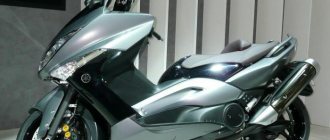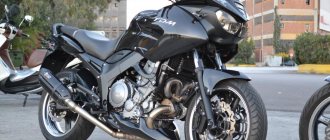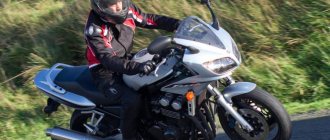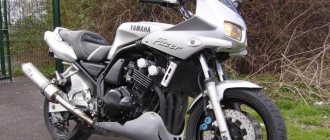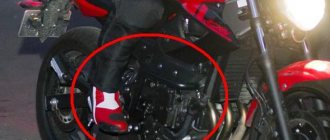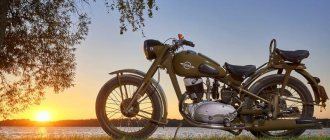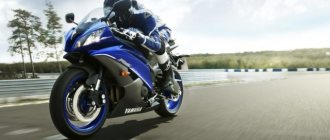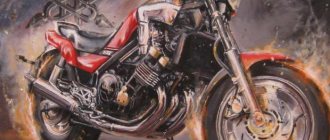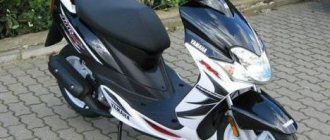Scooters have become increasingly popular recently because they are a cheaper and more convenient alternative to motorcycles, which are not as affordable for the average consumer. Especially worth noting is such a thing as a maxi-scooter. Unlike conventional models, these are larger in size, have greater performance, and in appearance they are no longer so different from motorcycles. That is why this version is becoming a worldwide success, and many manufacturers are starting to produce their analogues and improve previous vehicles in order to be able to promote their products to the masses. This article will talk about one of the most popular maxi-scooters today called the Yamaha T-Max 500, which was first released more than fifteen years ago, but still continues to be improved and updated. Why is he so good? What are its technical characteristics? Meet the Yamaha T-Max 500 maxi-scooter in all its glory.
Maxi scooters in Japan and the world
Japanese scooters are considered one of the most popular and successful in the whole world, and Yamaha is the leader in their production. However, it is worth noting that maxi-scooters are relatively new compared to motorcycles. To be more precise, their debut took place in 1994. It was then that the first Yamaha T model appeared, from which the scooter discussed in this article later developed. How was he different from the rest? The fact is that the letter in the name – “T” – is an abbreviation for twin, that is, “double”. This indicates first of all that this scooter, unlike conventional ones, uses a two-cylinder engine, and secondly, this letter demonstrates that this model has a dual purpose, that is, it can be used both as a scooter and as a motorcycle . Since then, a variety of Japanese scooters and models from other manufacturers have appeared that combine both functions, but this one has become iconic in history.
Similar models
- Piaggio X9 500. A maxi-scooter, not often seen in Russia, originally from sunny Italy, stylish, quite expensive and extremely comfortable.
- Honda Silver Wing 600. Massive, large and not the easiest device to operate. But it also has undeniable advantages - many rightly call it the most comfortable maxi-scooter of all.
- BMW C650. Available in several versions, differing mainly in configurations and suspensions. It looks cool, drives well, and is expensive.
- Suzuki Burgman 650. Most similar to the Silver Wing 600. Unlike the Yamaha T Max, it is not suitable for sports riding. But it is very, very comfortable.
Specifications: Engine
Since we are talking about the engine with which this scooter is equipped, it is worth taking a closer look at this heart of the Yamaha T-Max 500 model. First of all, you should know that this engine is four-stroke, has liquid cooling, and is also equipped with four valves. each of two cylinders. Its volume is 499 cubic centimeters, and its power is 44 horsepower. It is also worth noting the good torque of 45 Nm. These are the basic parameters, but if we talk about more specific features, then you should know that this engine has a fuel injection system and has a multi-plate automatic clutch. And, of course, it is worth noting that the fuel tank capacity of this model is fifteen liters. However, the engine is not all that the Yamaha T-Max 500 scooter has.
Scooter frame
As mentioned earlier, this model has been out for a long time, so you shouldn’t be surprised that the frame for each of them will be slightly different. New scooters are taking on a more modern look, so their frames are changing accordingly. This article will describe the latest generation of these scooters, which was launched on sale relatively recently - in 2012. So, the front suspension of this model is made in the form of a telescopic fork, and the rear suspension is a pendulum arm. The front wheel has two brake discs with a diameter of 267 millimeters, and the rear wheel has exactly the same one disc. The size of the front tire is 120 by 70, while the rear has slightly different parameters - 160 by 60. And, of course, it is worth noting that the new scooters look different from the representatives of the previous generation, and the difference is even more noticeable, if we compare the last generation with the first.
Dimensions
Since we are talking about what the Yamaha T-Max 500 scooter looks like, the technical characteristics of this model also include its overall dimensions. This scooter is about 2.2 meters long, 77 centimeters wide, and 1.4 meters high. The length of the wheelbase is one and a half meters, and the height, measured not as a whole, but by the seat, is 80 centimeters. In addition to the basic parameters, there is also a minimum ground clearance, which for this scooter is 12 and a half centimeters. As for weight, compared to previous generations, the new model is lighter - it now weighs 208 kilograms, which is a very good indicator for such a vehicle. At the same time, all the scooter’s devices remained in place, that is, the loss in mass did not occur due to the abandonment of important elements.
Total
The Yamaha TDM 850 was born too unusual, too different from other motorcycles. This did not prevent it from living a long and glorious life, and the fact that copies released almost 30 years ago are still traveling on the roads only confirms its reliability. If you want a bike that is durable, versatile, comfortable and, moreover, capable of giving adrenaline, but you don’t have extra money and you don’t want to take out loans, the TDM 850 is an excellent choice. Yes, it is not easy to maintain, but, as they say, it is difficult in training - easy in battle. So here, in the garage it can be difficult, but on the road you can rely on the TDM 850 in full confidence that it will not let you down.
Specifications
| Power: | 77.0 hp (56.6 kW) at 7500 rpm - TDM850 ('91-95); 80.2 hp (59.0 kW) at 7500 rpm - TDM850 ('96-98); 83.0 hp (61.0 kW) at 7500 rpm - TDM850 ('99-01). HP |
| Torque: | 75.5 Nm (7.6 kg-m) at 6000 rpm - TDM850 ('91-95); 76.8 Nm (7.7 kg-m) at 6000 rpm - TDM850 ('96-98); 80.4 Nm (8.1 kg-m) at 6000 rpm - TDM850 ('99-01). Nm |
| Engine type (cylinder arrangement): | 2-cylinder, 4-stroke, in-line |
| Number of cylinders: | 2 |
| Engine capacity: | 849 cm3 |
| Cooling type: | Liquid |
| Transmission: | 5-speed manual |
| Drive unit: | Chain |
| Frame: | Steel diamond-shaped |
| Weight: | 229 kg; 232 kg – TDM850 ('98-01) kg |
| Tank capacity: | 18.0 L – TDM850 ('91-95); 20.0 L – TDM850 ('96-01). l. |
| Maximum speed: | 202 km/h |
| Wheelbase: | 1475 mm |
Two options
You should definitely pay attention to the fact that the Yamaha T-Max 500 maxiscooter is available in two versions - regular and special. What is the difference between them? In fact, the difference is quite small and barely perceptible, but it is still there. Manufacturers have designated a special version intended for long trips - in other words, a tourist version. This touring modification has some differences, such as a less massive fairing, modified optics, a more impressive windshield, as well as additional suspension tuning to make your ride more comfortable on the road. Thus, you can independently tune the Yamaha T-Max 500 without needing any additional funds. But if you wish, you can get an ordinary model and tune it yourself, which will be discussed later.
Pros and cons of Yamaha T Max
Advantages
- An unprecedented combination of comfort, dynamics and handling. Undoubtedly, there are more driving or more comfortable motorcycles and maxi-scooters, but none of them can boast of all these qualities at once to the extent that the Yamaha T Max can.
- Excellent brakes, which the maxiscooter inherited from one of the most famous sportbikes in the world.
- The range is over 250 kilometers without refueling, especially if you drive at a moderate speed of 110-120 km/h.
- Excellent wind protection at any speed up to maximum.
- Confident acceleration dynamics. When starting from a traffic light, the Yamaha T Max will leave behind many seemingly more powerful motorcycles, not to mention cars.
- Durable plastic that can withstand most drops.
Flaws
- Due to the small wheels, any road irregularities are felt very strongly.
- On the first generations of the Yamaha T Max 500, the fuel pump requires attention, as it sometimes overheats and fails, especially if you often drive with an almost empty gas tank.
- When driving in traffic jams, gasoline consumption increases very noticeably. In addition, the T-Max 500 is very demanding on fuel quality, and the T-Max 530 is even more so.
Improved braking system
The Yamaha T-Max 500 scooter also has one feature that you can get for a small additional fee. The fact is that the manufacturer allows the buyer to choose the braking system, and if you are willing to pay a little more, you can get the ABS system, which is much more reliable and efficient, electrically controlled and the most advanced to date. But, as with the touring version, there's no forcing you to make that choice, so you can stick with the standard brakes. In the case of the Yamaha T-Max 500 scooter, reviews regarding the basic braking system are good, so the choice in favor of ABS can only be made if you have a strong desire - there is definitely no need for this. However, user reviews will be discussed in more detail a little later.
High competitiveness
Many people may wonder: why buy such a maxi-scooter if you can buy a tourer motorcycle and enjoy traveling on it? But in reality, practice shows that a huge number of people have already chosen this model for a variety of reasons. And if it seems to you that a scooter cannot be as comfortable as a motorcycle, then you should pay attention to the fact that this model has absolutely all the necessary accessories that can be found on any tourer of the latest generation - including even heated ones handles and seats for those who like to travel at night or in the cold season. As mentioned earlier, in recent years, maxi-scooters are no longer inferior to full-fledged motorcycles.
YAMAHA MAXAM 250
Product code: NMB10383
This item is not for sale or is out of stock
Notify about arrival
- Location: Krasnodar
- Year of manufacture: 2005
- Mileage: 18147 km
- Note: The cost includes delivery, customs duties and all additional payments in Krasnodar. Purchase on credit is possible.
Manufacturer information
- Yamaha Maxam 250 (nmb10383)
- 14 Nov 2014
1722
Documents and files
experts
Tell us about the product
Tell us about the product, it will help other buyers.
Subscribe to our channel
Call center 24 hours. Any questions from those. consultations to assistance with placing an order.
Warranty on all products
Warranty for goods from 6 months to 3 years. If there is a defect, we will replace the product without any questions asked.
Secure payment methods
Pay by credit card, PayPal, bank transfer or cash upon delivery.
Delivery throughout Russia
You can choose delivery by courier, Russian Post or at a pick-up point.
We will pack it well, send it for delivery and monitor the order until delivery.
Speed indicators
Particular attention should be paid to the speed this scooter can reach. People are accustomed to the fact that such a vehicle is a kind of toy, capable of traveling no more than sixty kilometers per hour. Of course, there are scooters that even teenagers can ride, but this particular model, like many of today's highly specialized scooters, can demonstrate incredible performance. For example, this scooter can accelerate to 187 kilometers per hour, which is very good. Naturally, this cannot be compared with the latest generation of motorcycles, on which you can accelerate to more than 300 kilometers per hour, but it is worth understanding that a maxi-scooter does not set itself the task of overtaking a motorcycle in a speed race. And in the sales race, this vehicle is gaining momentum every year.
Disadvantages of the model
- The cost of acquisition and maintenance is quite high.
- The engine power is not enough for the sporty characteristics of the scooter. For this reason, acceleration to 50 km/h is slower than that of competitors.
- It is quite difficult to turn around due to the high seat.
Overall, the Tmax is a pretty good option for daily commuting. Its characteristics are more than sufficient for moving around the city. In addition, the bright sporty design does its job. Among the maxi-scooters on the market, Yamaha has the best handling, high reliability and quality.
This is a great option for driving on streets with a lot of turns where you can't really accelerate. If the company revises the design and installs a more powerful engine, Yamaha will leave all competitors behind.
Tuning
As for tuning, many users of this scooter report that if desired, it can be “pumped up” very well, and you can start with the engine and brakes and even end with the body itself. Naturally, many people concentrate on pumping the suspension, because this model has some difficulties with it. And it’s not even about the quality of performance, because here it is at the highest level. You will learn more about the shortcomings of the suspension later, when reviews of this scooter are reviewed. Now the time has come to figure out how much it will cost to purchase such a latest-generation scooter. After all, not everyone is ready to spend a large sum on buying a scooter, when you can add a little and buy a motorcycle.
Similar models
The Yamaha TDM 850 has practically no analogues; this motorcycle was completely unique for its time, and modern two-wheeled crossovers are too different from it and cost completely different money to be able to compare them correctly. The only truly similar bike is the Yamaha TDM 900, which is a modified version of the second generation TDM 850 with fuel injection, a retuned and filed engine and other minor changes. Finding a 900 cc version is not difficult, and almost all the advantages and disadvantages have been transferred to it from its carburetor ancestor. With the exception of oil burns, Japanese designers managed to successfully solve this problem on the TDM 900.
Price
If you search for used scooters, you'll likely find better deals. However, if we consider new models that are purchased immediately after their production, then prices may vary depending on the configuration that you choose for your scooter. The most basic version costs about 830 thousand Russian rubles, but as you remember, you can equip it with a modern braking system, heated accessories - or even choose a tourist version of the model. All this can gradually increase the cost until it reaches its maximum level. A fully equipped maxi scooter of this model will cost a hundred thousand rubles more, so you will need to be smart about choosing what components you want in your vehicle.
Positive reviews
First of all, it is worth considering the positive reviews of those people who own this scooter or have had the opportunity to spend so much time driving it in order to form any clear and informed opinion. So, most people note the outstanding design of this vehicle - especially compared to how this scooter started out in 2001. People also like the speed of this model, and in addition to it, the sound of the engine at high acceleration. Almost everyone notes the high build quality and reliability in use. Some especially highlight the fact that the maxi-scooter, despite its large size, does not require a huge amount of fuel, and is also extremely easy to operate. At the same time, impressive wind protection is also an advantage - naturally, especially in the case of a touring model.
Impressions from the Yamaha DA202 DAC (2x PCM56)
Over the past decades, many different DACs have been created in the world and it is not realistic to hear them all; some models pass unnoticed undeservedly and vice versa. An audio enthusiast under the nickname Minolta shares his impressions of one such DAC model - Yamaha 202 - with us, read and comment. I would like to share with the readers of the site hifi-audio.ru my knowledge and experience of listening to the very rare professional DAC Yamaha DA202 in our country. First, I’ll tell you how it ended up in my system and what were the prerequisites for this. My system now is a Pioneer A-717 amplifier and a Triangle Altea Borea speaker. The starting point was the purchase 2 years ago of a Yamaha CD-N500 multiplayer, which I was completely satisfied with its omnivorousness and flexibility of settings. I wanted to be able to work with FLAC files, but without using a computer directly in the listening room.
Of course, the player provided these opportunities. For a device costing 20,000 rubles, I received a CD player, network player, USB input for storage devices and Internet radio. It was possible to set up all the work via an external Wi-Fi router with connection via a network to a computer as FLAC storage. Everything is convenient. But everything is not perfect.
Pioneer A-717 with the cover removed - luxury and beauty. In my case, the downside of this player was the sound quality. Probably if this was the only source in my system, I wouldn’t worry; it plays, in principle, not bad, brightly, dynamically.
Acoustics Triangle Altea Borea
But before this player I already had: a turntable for vinyl with a Shure V15 Type III cartridge and a Denon DCD-1700 pretop CD player from 1987. So, in comparison with these sources, the Yamaha CD-N500 had a lot of disadvantages. Namely, skinny bass, almost complete absence of any variety of timbres, the stage is wide but absolutely flat, all the instruments and the performer stand in one line and are right in close proximity to the listener. The only thing there were no complaints about was the performance of the high-frequency spectrum.
And the experience of communicating with delta sigmas was not very good. I listened to different modern players at my friends’ houses and everywhere I missed the halftones of the music, the richness of timbres. The piano everywhere sounded like someone was hitting a rail with a rod. I decided to see what was on multibeatniks and preferably in my hometown. I found an interesting device at a local flea market, a professional Yamaha DA 202 DAC, called the seller, and he kindly agreed to come to my home with it and listen to it on my system. So, I'm waiting. A man arrived, we first connected him with a Denon DCD-1700. We listen to different materials: Pink Floyd, Sukachev, Hans Zimmer, Swan Lake and…. We don't hear the difference. I think there are two options: either the DAC does not work, or its quality is at the level of the player, the sound of which suits me quite well. Connect to Yamaha.
And here it is happiness, the first thing that catches your ears: a huge palette of sounds and after-sounds, the piano finally becomes a piano and not a rail. The scene gains depth and I begin to distinguish instruments not heard on recordings before. The bass is deep and fast. And most importantly, not only CD but also FLAC plays through the DAC, for which everything was started.
Of course, I decide to keep the DAC for myself, they don’t look for good, maybe later I’ll experiment with the ESS 9018, but not now.
In the evening I removed the top cover of the DAC, I was pleased that the case was filled not with air but with a solid transformer, a large circuit board in the entire case and two BB PCM 56 grade K chips.
I am not an electronics engineer and cannot appreciate the beauty and correctness of the work of Yamaha engineers, but it is definitely safe to say that not only professional amplifiers were successful at Yamaha, but also professional DACs.
By the way, you need to take into account that it is connected only with balanced wires, fortunately the seller kindly sold his XLR - RCA wire.
When I looked for reviews about the YAMAHA DA202 on the Internet, there were practically none. But there was one interesting application of this DAC on the forum of musicians playing synthesizers.
They bought an inexpensive model of a Roland synthesizer, connected it to this DAC and received sound level of a top-end device. I think these guys' hearing is fine.
6, total, today
Negative reviews
There are practically no negative reviews for this scooter in particular - most people simply note some of its shortcomings in their positive reviews. And this can be easily understood by the fact that they highlight only two shortcomings, both of which are repeated from review to review. The first is the suspension, this drawback has already been mentioned in the article. The fact is that the suspension of this scooter was developed for Europe and, accordingly, for European roads, such as the German Autobahn. Therefore, the suspension here is extremely sensitive, and if you drive on uneven roads, you will feel every bump you roll over. The second disadvantage is the high cost of repairs and maintenance. Indeed, this scooter itself is not that cheap, but at the same time repairing it is a complete nightmare. Therefore, it is much easier not to break it, that is, to drive carefully and wisely.
Pros and cons of the Yamaha TDM 850
Advantages
- Affordable price. Due to its age, you can buy a TDM 850 for a very modest amount of money, although you need to inspect the motorcycle very carefully before purchasing. Nothing lasts forever, and a 25-year-old bike will only remain in good condition if it has been in caring hands for a long time.
- Sturdy and durable plastic. He survives most falls without consequences, unless, of course, they occur at significant speed.
- Surprisingly good standard light. However, this is relevant mainly for the first generation TDM 850.
- Dynamics. The bike accelerates very quickly even with a load and a passenger.
- Brakes. They are efficient enough for aggressive riding even by modern standards.
- Maneuverability. Thanks to the successful weight distribution, the motorcycle subjectively does not seem heavy, and it is very easy to control.
- Power reserve. The fuel consumption of the TDM 850 when driving at a speed of 130-140 km/h does not exceed 6 liters of AI-92, and the tank holds from 18 to 20 liters of gasoline.
Flaws
- The engine has a habit of eating oil. It is necessary to constantly monitor its level.
- Difficult to maintain. This is a price to pay for versatility in use, but maintaining the Yamaha TDM 850 is really not easy. So, to replace the spark plugs, you need to drain the antifreeze and dismantle the radiator, and to get to the battery, you have to remove the gas tank and side plastic.
- Bad carburetors. The problem can be treated by replacing it with others from TDM 850 1999-2001.
- Controversial rear brake caliper design. It sometimes jams a little, which leads to accelerated wear of the brake disc and pads.
- Difficulty finding spare parts. It’s difficult to find something more serious than spark plugs or a battery for the TDM 850 in stock even in a large city, so you have to order what you need from Japan and wait for delivery.
